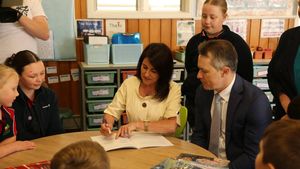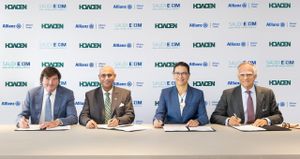Russian President Vladimir Putin has recently put forth proposals inviting American companies to invest in rare earth mining within Russian-controlled regions of Ukraine, as well as aluminum production in Siberia. These remarks, made during an interview with state television, highlight Russia's intent to bolster economic partnerships with U.S. firms amid the continuing conflict between the two nations.
Putin emphasized the potential $15 billion initiative to develop aluminum reserves located in Siberia’s Krasnoyarsk region, stating, "We could invite American companies to work with us on our resources." This opportunity is particularly significant considering the U.S. imports about half of its aluminum, primarily from Canada, emphasizing the strategic importance of exploring alternative sources—a factor underscored by Russia's status as one of the top four global aluminum producers.
During his interview, Putin mentioned the recent Russian military claim of control over a lithium deposit located near Shevchenko, Donetsk, characterizing the material as 'strategically important' for Europe and the U.S. Pro-Russian bloggers noted the potential for Russia to utilize such resources as bargaining chips during negotiations related to the war.
Putin stated, "Russia has significantly larger reserves of rare earth metals than Ukraine and is ready to work with our foreign partners, including Americans, to develop these resources." This invitation extends to regions under Russian control, such as Donbas and Novorossiya, indicating Moscow's aim to solidify economic ties even as military actions continue.
These remarks come following shifts in U.S. foreign policy under former President Donald Trump, who advocated for U.S. involvement in Ukraine's rare earth revenues. Putin’s allusion to Trump's focus on business opportunities signals Russia's willingness to find common ground on economic cooperation, even as broader geopolitical tensions remain tense.
Besides economic proposals, Putin also discussed defense budgets, advocating for both Russia and the U.S. to cut their military expenditures by 50%, with potential inclusion of China. He characterized this suggestion as "good," reflecting his openness to discussions of military spending reduction—a sentiment echoed by Trump during his presidency.
On the political front, Putin claimed Ukrainian President Volodymyr Zelensky would be unable to win any elections against General Valery Zaluzhny, Ukraine's former military command chief. While polls show Zaluzhny gaining popularity, Putin's comments appear as rare acknowledgment of Ukrainian political dynamics, positioning the discussion on Ukraine's leadership within the broader narrative of the conflict.
Despite these overtures, Putin was clear about his reluctance to quickly resolve the Ukraine conflict. He mentioned the issue was only briefly referenced during recent talks with Trump and discussions involving U.S. and Russian representatives held in Saudi Arabia. Stressing the importance of European participation, he criticized Zelensky for banning negotiations with Moscow and accused EU leaders of skewing too closely to Kyiv's stance.
Notably, Putin expressed conditional openness to broader international participation, insisting other nations, particularly from the BRICS block, should contribute to future negotiations, underlining his desire for more inclusive discussions.
Overall, as Russian forces continue their advances within Ukraine, the dynamic of proposed economic partnerships juxtaposed against military engagement raises significant questions about the future of Russia-US relations and the resolution of the Ukraine crisis. While proposals signal potential for economic collaboration, they do not translate to any urgency to halt military actions or progress toward peace.



